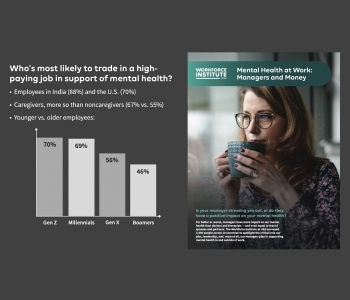Manager mental health influences and employee mental wellness
In the workplace, managers and leaders have significant influence over employee mental health. Securing managers mental health within an organization is a must if those managers desire to understand the value of creating a work environment and human relations that positively impact their team’s mental well-being
As our schools have lacked intrapersonal education, most business leaders overlook the value of securing good mental fitness, and the majority of them lack a systematic, proactive mental wellness approach that is available for every employee.
The survey 'Mental Health at Work: Managers and Money' among 3 400 employees and managers in 10 countries (Australia, New Zealand, USA, Canada, France, Germany, India, Mexico, the Netherlands and the UK) by The Workforce Institute UKG, pointed out that although 3/5 of the world’s employees say their job impacts their mental health more than their doctors and therapists, employees feel tired and stressed.
Clearly, this is a missed opportunity to improve individual health and work results. Let's dig deeper and see what can be done to improve the situation.
Manager mental wellness and employee mental health situation
Every third employee states that their manager fails to notice their own impact on their team’s mental well-being.
7 of 10 employees stated that they would like their company and manager to support mental health more than they currently do. So, employees know that mental wellness depends on how their superiors treat them.

Here are the other key findings from this white paper are:
- 81% of employees stated that they would prioritize good mental health over a high-paying job
- 78% of employees state that stress negatively impacts their work performance;
- 71% point out that their stress level also impacts their home life;
- 69% of employees said that managers have just as much of an impact on people’s mental health as their spouses, and 51% stated that managers have more impact on their mental health an impact than their doctors;
- 64% admit they would take a pay cut if the new job supports their mental wellness better than the current one;
- 60% of employees state their job is the biggest factor influencing their mental health and wellbeing;
- 40% of employees are “often” or “always” stressed about work, but 38% say they “rarely” or “never” talk with their manager about their workload.
These Workforce Institute findings indicate that companies need to stop ignoring the mental health situation and make mental wellness investments a clear priority for their staff.
How is the leader and manager mental health situation?
It isn’t just employees who are overly stressed, as managers and other business leaders are often even more influenced by work stress and burnout than their employees.
The Workforce Institute found that managers are 42% more often stressed out than their team members, and senior leadership is 35% more experience different levels of burnout.
Business owners need to understand that up to 33% of C-level leaders say they don’t want to work anymore, and 40% state they consider quitting within the year because of work-related stress.
Obviously, employees will find it hard to remain mentally well if workplaces and managers are unhealthy, and human relations at work are hectic and toxic.
The report states, "More than a quarter of employees (28%) take off only one to four days at a time, and 85% of employees don’t use all their allotted time off. The trouble is, 89% of managers and 88% of C-suite leaders don’t either. Management should always model good behavior for their people by taking meaningful time off so everyone knows it’s best practice to come back rested, refreshed, and focused."
Only when managers show examples and train their minds and mental strength will they understand the actual benefits of the workplace-wide proactive mental wellness approach.
We remind you that supporting the discovery of mental wellness and mental sharpness can be your biggest business advantage. Especially now, when excellent leaders and professionals are hard to find and take a long time to train.
Conclusion
Lack of mental wellness sabotages work results. It is wise to remember that the same awareness-based intrapersonal skills that keep our minds fit and well will also help people to focus, be creative, have access to insights, etc.
Mentally well-doing workplaces, where managers and leaders consider mental wellness training a proactive priority, allow a win-win approach.
Mental wellness needs to be seen as an investment because it brings tenfold ROI, as we have amply demonstrated over and over again.
|
This summary of the report is provided by Kaur Lass





